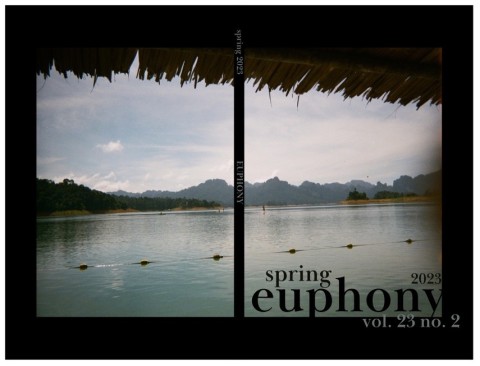A Euphony Journal meeting wouldn’t be complete without three non-negotiables: reading, debating and eating Oreos.
Each week, the recognized student organization (RSO) gets together to mull over prose and poetry. Sitting seminar-style in Harper Memorial Library, the focus of their discussion is interpretation and craft.
It’s like a book club, and twice a year they round up their favorite submissions to put them to a final vote. The result is a polished print issue, brimming with stories and poems written by authors all over the world.
Euphony Journal was founded in 2000, making this its 24th year in publication. Currently, it is led by managing editors and fourth-year students Tula Hanson and Madeline Fenster.
In February, the journal published its issue for Winter 2024, chock-full of written pieces that run the gamut from the breathtaking to the humorous to the macabre. But beneath the issue is another story, one that’s not in print—the behind-the-scenes work of Euphony members.

Sammy Aiko, also a fourth-year in the College and a poetry editor, screens the avalanche of submissions that Euphony regularly receives. After sifting through, they compile five of the best poems into a packet.
“To do the packets, I usually end up opening 10 to 15 emails, so that’s 50-plus poems [per week],” they said. Needless to say, they do a lot of reading, and it’s not uncommon for the poems they receive to be about ghosts and dead bodies.
“I don’t know if that’s because I said I like [morbid content] on our website,” they said. “Our Instagram bio is now ‘the most haunted student-run literary journal at UChicago,’ so weirdly, I think we’ve leaned into the gothic aesthetic a bit.”
A small portion of submissions come from UChicago students, but the majority is from aspiring authors all over the world. Though there are submission instructions, there aren’t restrictions on who can submit or what they can submit. Moreover, the published pieces are kept intact—aside from grammatical corrections, nothing goes under the editorial knife.
“We take pieces as-is, and evaluate them as a whole,” Hanson said. A good piece, she said, has more than strong sentence-level craft. “It’s also about whether it works as a whole—in that it evokes this feeling that makes you want to read it again.”
Once both the prose and poetry packets are assembled, they are emailed to the entire RSO. Members, whether on the editorial board or not, read them and attend the next meeting for an animated conversation about each submission, asking questions such as: What if this story happened in real life? How smooth is the poem’s cadence? What tropes does it address?
Afterwards, it’s time to pass judgment.
“We have multiple passes of voting,” Fenster said. “The pieces that get a ‘yes’ we’ll talk about in final considerations.”
A submission that has survived until these final considerations will meet one of three fates: rejection, online publication or print publication. Since the RSO reads around 10 packets each of prose and poetry, one of both per meeting, it generally takes 10 weeks to make the final packet, which consists of submissions that received a majority of “yes” votes.
The lucky (and talented) authors whose work is ultimately selected will receive offer letters. Once Euphony is granted their permission to use their work, next the pieces are finalized, the editors’ letters are written and the cover design is chosen. Then it’s time to print.